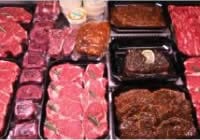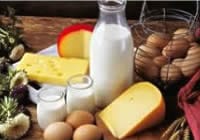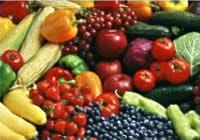Meat, Fish, and Poultry
 Keep all fresh meat, fish, and poultry in its store wrapping. (Re-wrapping increases the risk of exposing the food to harmful bacteria.) If the item didn’t come in a Styrofoam tray, slide a plate underneath it to catch any drippings.
Keep all fresh meat, fish, and poultry in its store wrapping. (Re-wrapping increases the risk of exposing the food to harmful bacteria.) If the item didn’t come in a Styrofoam tray, slide a plate underneath it to catch any drippings.
Dairy
- Leave cottage cheese, yogurt, sour cream, milk, and cream in the containers they came in.
 After transferring milk to a jug or sour cream to a serving bowl, don’t return them to the original containers. Instead, tightly cover the jug or bowl with plastic wrap.
After transferring milk to a jug or sour cream to a serving bowl, don’t return them to the original containers. Instead, tightly cover the jug or bowl with plastic wrap.- Store hard cheeses in the store wrapping until you use them, then wrap them in wax paper, foil, or loose plastic.
- Plastic milk bottles make more sense than cardboard cartons, since bacteria can grow near the cardboard spout and enter a glass of milk every time you pour. Nevertheless, as long as you use the milk within its shelf life, it should be safe to drink.
Fruits and Vegetables
 Keep fruits and vegetables separate and store like with like: apples with apples, carrots with carrots. Fruits and vegetables give off different gases that can cause others to deteriorate.
Keep fruits and vegetables separate and store like with like: apples with apples, carrots with carrots. Fruits and vegetables give off different gases that can cause others to deteriorate.- Store fruits and vegetables susceptible to drying out in perforated or unsealed plastic bags to maintain a moist environment yet still allow air to circulate.
- Don’t wash produce before refrigerating it. The dampness can make it mold and rot more quickly.
Leftovers
- Store all leftovers in airtight, leak proof clear containers or wraps.
- Divide leftovers into small, flat containers so that they cool faster. (Some bacteria spores survive the cooking process and may germinate if the food is at room temperature long enough.)
- Refrigerate leftovers within two hours of cooking. And there’s no need to wait for piping-hot foods to cool down before storing them – modern refrigerators can handle the heat.
- Don’t refrigerate leftover foods in cans. Once a can is opened, residual metal on the rim can leach into food and leave a metallic taste.
- Don’t stuff the refrigerator too full. Cool air needs to circulate to keep food at a safe temperature.
 Keep all fresh meat, fish, and poultry in its store wrapping. (Re-wrapping increases the risk of exposing the food to harmful bacteria.) If the item didn’t come in a Styrofoam tray, slide a plate underneath it to catch any drippings.
Keep all fresh meat, fish, and poultry in its store wrapping. (Re-wrapping increases the risk of exposing the food to harmful bacteria.) If the item didn’t come in a Styrofoam tray, slide a plate underneath it to catch any drippings. After transferring milk to a jug or sour cream to a serving bowl, don’t return them to the original containers. Instead, tightly cover the jug or bowl with plastic wrap.
After transferring milk to a jug or sour cream to a serving bowl, don’t return them to the original containers. Instead, tightly cover the jug or bowl with plastic wrap. Keep fruits and vegetables separate and store like with like: apples with apples, carrots with carrots. Fruits and vegetables give off different gases that can cause others to deteriorate.
Keep fruits and vegetables separate and store like with like: apples with apples, carrots with carrots. Fruits and vegetables give off different gases that can cause others to deteriorate.
